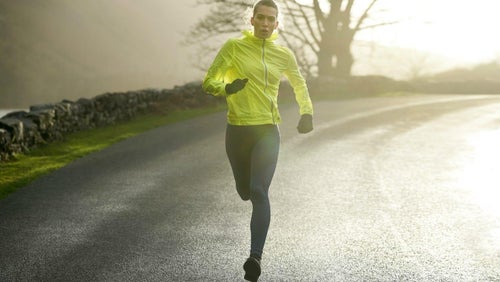Running for Anxiety | What You Need to Know

Anxiety affects many of us, for a plethora of unique reasons, often negatively impacting our daily lives and the way we feel about ourselves. Managing symptoms of anxiety through a positive outlet can seriously improve your day, here’s how:

What is anxiety?
Anxiety is a general feeling of unease, like worrying or being fearful. Symptoms manifest not only psychologically, but also physiologically, resulting in things like sweating or shaking, with symptoms ranging from mild to severe, depending on the situation and the individual.
In sporting situations, moderate levels of anxiety (known as arousal) can be advantageous to performance, but people often find symptoms to be disruptive and problematic when presented in daily life.
5 Ways running helps to combat anxiety
1. Vitamin D
Of course, this requires you to get out on the road instead of on a treadmill. There are documented links between vitamin D and depression, and even some findings suggest that vitamin D deficiency can influence anxiety disorders. A lack of vitamin D can also lead to an increase in cortisol, a stress hormone, that can ultimately contribute to heightening the symptoms of anxiety.
Getting enough vitamin D, both from dietary sources and from sunlight, is a good place to start when looking for strategies to physiologically reduce symptoms of anxiety.
2. Reduced stress
Endorphins such as dopamine, serotonin, and norepinephrine are chemical neurotransmitters that result in positive feelings and in some cases, euphoric feelings (like runners high). These positive feelings, combined with their tendency to reduce cortisol, can aid in your efforts to manage symptoms of anxiety.
Notably, cortisol blocks the receptors in your body needed for effective utilisation of vitamin D – meaning that if you have high-stress levels, then your body is also unable to properly utilise sources of vitamin D, further contributing to negative symptoms being experienced.
3. Improved sleep
Running can improve the quality and quantity of sleep that you get by inducing greater fatigue and by stimulating the release of neurotransmitters, such as serotonin which is responsible for facilitating the all-important REM phases of sleep. Getting enough good-quality sleep contributes to a more stable hormonal balance within the body, which in turn can help in the management and reduction of symptoms of anxiety.
4. Community
It is well documented that socialisation can help to reduce symptoms of anxiety and also help to boost our confidence. One of the best ways to socialise when running is to join a community, whether that’s a local running group, or by finding like-minded runners on apps like Strava that help to connect you to others that use the same routes you do.
5. Fight or flight
Anxiety is essentially the mind preparing the body for a fight or flight situation, but the problem is, the situations that make us anxious are often not appropriate for this type of approach. Exercise in general activates the regions in your brain that are responsible for executive function, which helps to control the system in the brain that detects real or imagined threats to survival that stimulate the fight or flight response.
Running is therefore an effective method of helping our brain to process this type of information more effectively, reducing the prevalence of anxiety and those types of symptoms when presented with normal situations in daily life.

How to Get Started
Just by thinking about it, you’ve already started. Now it is time to capitalise and make your move. Here's how:
Set Realistic Expectations
There’s nothing worse than not hitting your goals. Very much demotivating. By setting yourself a realistic target, you are sure to avoid disappointment if you were to not meet your goal that is out of your reach. Don’t expect to be hitting record 5k runs after 5 days. Take it slow and enjoy your progress. This will make you feel great.
Start off Slowly
Don’t be walking out the door and hitting a record 10k. You’ll simply work yourself too much and likely not complete it. Start off by walking if you have to and build the distance and pace each day but do not neglect your rest days.
Warm Up
Prepare your body and reduce injury by warming up. This is essential before doing most exercise in order to reduce the chances of getting injured and the aftereffects of exercise. May be recommended to cool down afterwards for the same reasons.
Remember to Stretch
Stretching would be recommended regardless of your exercise. If you have the time, Yoga would be highly suggested. Stretching for exercise will help your flexibility, overall wellbeing and reduce stiffness in everyday life. If you experience DOMS, stretching will reduce this meaning you can get up and down the stairs much easier.

The Running Warm-Up | Why and How to Warm-Up Before Your Run
Here's why you shouldn't skip that warm-up.
Find the best place for you
Running can be different for everyone. Some may enjoy jumping on a treadmill and zoning into some music while eating the miles whereas getting outside in the fresh air will have an amazing effect on your mental well being when you consider the views and natural sunshine, and you can throw your headphones in too.
Take Home Message
Running provides a positive method that allows you to manage symptoms of anxiety in a healthy way. Although it is by no means a cure, managing symptoms can often have a significant impact on daily living, so it’s certainly worth a try!
READ MORE HERE:





